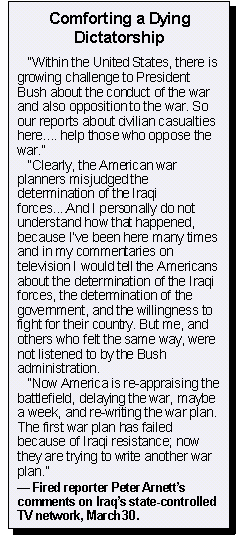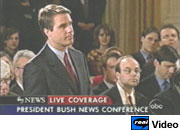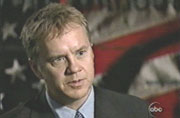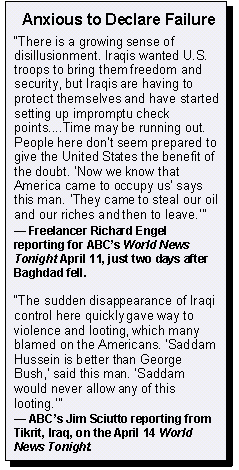 |
||||||||||||
|
||||||||||||
 |
||
|
 |
||||||||||||
|
||||||||||||
 |
||||||||||||||||||||||||||||||||||||
|
||||||||||||||||||||||||||||||||||||
|
Still Liberal, Still Biased
How Big Media Helped the Left and Hurt the Right in 2003
By Tim
Graham and Rich Noyes
January 2004
Section 2 of 6
|
March Peter Arnett Comforts a Dying Dictatorship: As a CNN reporter during the first Gulf War back in 1991, Peter Arnett transmitted Saddam Hussein’s lies to an international audience. Before this year’s Gulf War, MSNBC and NBC chose to give Arnett, technically a correspondent for National Geographic Explorer, a starring role in their war coverage. As he had a dozen years before, Arnett’s war stories often parroted the propagandistic claims of Iraqi officials without a trace of professional skepticism. On the Today show on March 26, for example, he told Matt Lauer a horrifying — and false — story about the U.S. using cluster bombs on civilian targets in Baghdad: “We traveled down a wide road, and we got to the scene, and shops on both sides of this highway had been destroyed, Matt, and there was smoldering, 20 or so smoldering vehicles in the street. Residents said that 11 o’clock this morning, local time, two missiles came in, exploded, and the first journalists there earlier said they counted 15 corpses. It was smoldering on the road. We saw body parts being handed around by people and it was, later the Information Minister, Mr. al-Sahaf, complained that the U.S. has started using cluster bombs in the Baghdad area.” An hour later, Arnett dutifully repeated the Information Minister’s claim about “cluster bombs,” again without any skepticism or doubt. NBC finally summoned its Pentagon correspondent, Jim Miklaszewski, who told Today’s audience the claim was highly dubious, that cluster bombs are normally used against troops in the field, not urban areas. Miklaszewksi explained: “It would be very unusual if, in fact, cluster bombs were used inside Baghdad. And if you look at pictures...a cluster bomb would create a Swiss-cheese effect, thousands and thousands of holes in the target, and we don’t see that.”
For that, NBC and MSNBC correctly decided to cease using Arnett’s reports, and National Geographic Explorer fired him. But in ending his contract, NBC said nothing about the substance of what he said and only cited how it “was wrong” to do the interview with Iraqi TV and “was wrong for him to discuss his personal observations and opinions in that interview.” After a farewell interview on Today, co-host Matt Lauer told Arnett, “Peter, at the risk of getting myself in trouble, I want to say I respect the work you've done over the last several weeks and I respect the honesty with which you’ve handled this situation. So good luck to you.” Within a day, Arnett had begun writing for Britain’s far-left, virulently anti-American Daily Mirror newspaper. In an essay about himself, Arnett claimed that he had lost his job because the U.S. government and “right-wing media” feared his “truth” telling. Arnett asserted in his story in the April 1 edition of the tabloid: “They don’t want credible news organizations reporting from here because it presents them with enormous problems.” And why, Arnett not so humbly wondered, was “my successful NBC reporting career...turned to ashes?” His answer: “Because I stated the obvious to Iraqi television; that the U.S. war timetable has fallen by the wayside.” Arnett elaborated on the conspiracy against him: “The right-wing media and politicians are looking for any opportunity to be critical of the reporters who are here.” Reporters Worry They Are Too Pro-Bush? As the “rush to war” approached an end after eight months, some reporters grew frustrated that the media was not stopping it. After a March 6 White House press conference failed to shake public confidence in President Bush, ABC reporter Terry Moran made waves by telling the New York Observer newspaper that Bush left his colleagues in the press corps “looking like zombies.” Observer columnist Matt Taibbi suggested reporters were routed, like Texans at the Alamo: “The entire White House press corps should be herded into a cargo plane, flown to an altitude of 30,000 feet, and pushed out, kicking and screaming, over the North Atlantic.” By October, Bill Moyers told the left-wing web site Buzzflash.com that “Matt Taibbi wrote in The New York Press at the time that it was like a mini-Alamo for American journalism. I’d say it was more a collective Jonestown-like suicide. At least the defenders of the Alamo put up a fight.” In reality, reporters had challenged the President with tough questions. CNN’s John King cited Ted Kennedy’s belief that “your fixation with Saddam Hussein is making the world a more dangerous place.” Ed Chen of the Los Angeles Times demanded to know that if Bush “trusted the people” with their tax cuts, why not trust them enough to give them an estimate of the war costs? Bob Deans of Cox Newspapers even suggested that the Vietnam War was unjustified since Vietnam hasn’t directly threatened American security in 30 years.
On the evening news shows preceding the prime-time event, Jennings asked Secretary of State Colin Powell: “So many people don’t understand why you shouldn’t let the inspections continue if they are accomplishing anything....Most people think they’re doing a reasonably effective job at the moment.” Over on NBC, Ron Allen was reporting from Iraq that “Tonight, word of America’s new deadline and threat of war fazed no one at this Baghdad café.” Allen then cited an Iraqi man: “America is a terrorist country, he says.” That morning, as the White House press corps prepared to pepper Bush with questions about his “arrogant...obsession” with Saddam Hussein, ABC’s Good Morning America was marveling at Saddam’s popularity. Diane Sawyer revealed: “I read this morning that he’s also said the love that the Iraqis have for him is so much greater than anything Americans feel for their President because he’s been loved for 35 years, he says, the whole 35 years.” From Baghdad, reporter Dan Harris seconded Sawyer: “He is one to point out quite frequently that he is part of a historical trend in this country of restoring Iraq to its greatness, its historical greatness. He points out frequently that he was elected with a hundred percent margin recently.” If the press were to be accused of acting like “zombies,” it was more plausible to argue they were zombies for Saddam than they were zombies for President Bush.
April Media Champion Free Speech - But Only for the Left: Before, during, and after the war, celebrities complained that their courageous anti-war stances would be met with harsh punishment in a dissent-hating America. But the networks love famous faces, and celebrities were being courageous all over the television dial, even as CNBC anchor Brian Williams was suggesting “what some say is a war on free expression in the United States.” But when a Republican Senator used his free speech to protest a forthcoming Supreme Court decision on homosexuality, reporters went from championing the intimidated to championing the intimidators who wanted the Senator to resign.
But on the April 16 World News Tonight, ABC’s Peter Jennings warned: “When we come back this evening, being against the war and in show business – and the people who want to punish you for that.” Tim Robbins gave a speech to the National Press Club complaining about the “chill wind” blowing against Hollywood peaceniks, and ABC’s Jim Wooten suggested, “All this has reminded some of the McCarthy era’s blacklists that barred those even accused of communist sympathies from working in films or on television.” Wooten reported on how anti-war entertainers like the Dixie Chicks had been boycotted by war supporters and how Robbins and Sarandon had been cancelled from an appearance at the Baseball Hall of Fame. Sean Penn sued producer Stephen Bing after he was dropped from a movie. That was the extent of the “oppression” on display. ABC did not note any Hollywood hypocrisy, since Robbins led members of the Screen Actors Guild in a 2000 strike of advertisers seeking higher payments. When actress Elizabeth Hurley accidentally crossed the picket line by making an Estee Lauder ad, Robbins suggested her SAG membership should be stripped, ruining her acting career. Not all political marches were promoted. ABC ignored a pro-troops rally in New York on April 10 that drew an estimated 15,000 people. On April 12, an estimated 5,000 gathered in Washington for a pro-troops rally on the same day that 40 people protested the Masters golf tournament. ABC covered the puny Masters protest, but not the DC rally. NBC devoted a story to the Masters protesters, but gave the DC rally a few seconds in passing. In April, it did appear dissent had its limits in America — when Associated Press editors and reporters tried to force Republican Senator Rick Santorum into resignation for suggesting that an absolute right to privacy would invalidate not only laws against sodomy, but laws against bestiality and other abhorrent sexual practices. Daily AP dispatches pounding Santorum appeared throughout the week of April 20 until polls showed his Pennsylvania constituency was supportive. NBC promoted the Santorum “scandal” with relish. On the April 23 Today, NBC’s Joe Johns reported: “Some conservatives and religious groups applauded Santorum’s comments. Leading Democrats were appalled, calling Santorum’s remarks out of step and backward,” but conservative spokesmen were not given soundbites in Santorum’s defense. Johns followed the liberal playbook by comparing the flap to Trent Lott’s Dixiecrat flap: “Only months ago Senator Trent Lott lost the top leadership job for racially-charged remarks. Now gay-rights groups want the party to take a stand on Santorum.” Johns aired a clip of Elizabeth Birch of the Human Rights Campaign, who wanted Santorum stripped of his leadership post. A Johns report also aired on that night’s Nightly News. The next morning on Today, Johns was back with another story that mentioned conservative support, but didn’t air it. Senator John McCain and political analyst Stu Rothenberg were awarded soundbites to express concern over Santorum’s political appeal. Then Couric interviewed NBC’s Tim Russert for emphasis. He, too, put the spotlight on opponents: “And some of the strongest criticism of Senator Santorum has come from within the ranks of the Republican party. You saw Senator Collins and Senator McCain, the Log Cabin Society [sic], a gay-Republican group, a Republican Unity Coalition headed by former President Gerry Ford and Mary Cheney, Vice President Cheney’s daughter, has also called on Senator Santorum to apologize.”
CNN Acknowledges They Were Soft on Saddam: On April 10, one day after the liberation of Baghdad, CNN’s top news-gathering executive Eason Jordan admitted to Aaron Brown on NewsNight that the network had suppressed stories about Saddam Hussein’s cruelties out of fear for the safety of CNN reporters and Iraqi citizens who worked for the network. “The secret police terrorized Iraqis working for international press services,” Jordan elaborated in a New York Times op-ed published the next day. “Some vanished, never to be heard from again. Others disappeared and then surfaced later with whispered tales of being hauled off and tortured in unimaginable ways.” “I came to know several Iraqi officials well enough that they confided in me that Saddam Hussein was a maniac who had to be removed,” Jordan disclosed. He argued that CNN could not reveal any of their information without putting lives at risk: “An aide to Uday [Hussein, Saddam’s son] once told me why he had no front teeth: henchmen had ripped them out with pliars and told him never to wear dentures, so he would always remember the price to be paid for upsetting the boss. Again, we could not broadcast anything these men said to us.” “I felt awful having these stories bottled up inside me. Now that Saddam Hussein’s regime is gone, I suspect we will hear many, many more gut-wrenching tales from Iraqis about the decades of torment,” Jordan concluded his op-ed. “At last, these stories can be told freely.” Jordan’s tardy truthfulness validated critics who deplored the sanitized coverage of Saddam’s regime: “Any Iraqi voicing an opinion other than those approved by the state would be vulnerable to arrest, torture and execution. But these were facts rarely mentioned by many reporters,” the New York Times’s John Burns wrote on April 20. Burns revealed how many Western journalists buried the evil truth about Saddam’s dictatorship just so they could maintain a presence in Iraq: “A tacit understanding, accepted by many visiting journalists, was that there were aspects of Mr. Hussein’s Iraq that could be mentioned only obliquely. First among these was the personality of Mr. Hussein himself, and the fact that he was widely despised and feared by Iraqis, something that was obvious to any visitor ready to listen to the furtive whispers in which this hatred was commonly expressed.” “The terror that was the most pervasive aspect of society under Mr. Hussein was another topic that was largely taboo,” Burns chastised. “Every interview conducted by television reporters, and most print journalists, was monitored; any Iraqi voicing an opinion other than those approved by the state would be vulnerable to arrest, torture and execution. But these were facts rarely mentioned by many reporters.” But other reporters indicated that Jordan should have kept his mouth shut. “If you decide to keep that as a secret for yourself to protect those people and to protect the interests of your company, then you probably ought to keep it secret for a long time, because it opens them up now wherever they go, wherever they’re stationed, ‘Well, what are they not telling us now?’” NBC anchor Tom Brokaw suggested during an April 15 appearance on CBS’s Late Show with David Letterman.
The Media Research Center For an interview with an MRC Spokesman, please contact Katie Wright at (703) 683-5004
Home | News Division
| Bozell Columns | CyberAlerts |
||||||||||||





 Peter Arnett’s worst treachery came March 30 when he appeared on Iraqi state television and praised the “determination” of Iraq’s army, declared the U.S. war plan a “failure” and arrogantly proclaimed that he had warned the Bush administration that Iraq wouldn’t be a pushover. Even though three U.S. journalists were missing in Iraq and feared kidnaped by the Hussein regime, Arnett mindlessly gushed: “I’ve met unfailing courtesy and cooperation, courtesy from your people and cooperation from the Ministry of Information.” Arnett then bucked up Iraqi morale, opining that their “resistance” had caused the initial U.S. war plan to “fail” (see box).
Peter Arnett’s worst treachery came March 30 when he appeared on Iraqi state television and praised the “determination” of Iraq’s army, declared the U.S. war plan a “failure” and arrogantly proclaimed that he had warned the Bush administration that Iraq wouldn’t be a pushover. Even though three U.S. journalists were missing in Iraq and feared kidnaped by the Hussein regime, Arnett mindlessly gushed: “I’ve met unfailing courtesy and cooperation, courtesy from your people and cooperation from the Ministry of Information.” Arnett then bucked up Iraqi morale, opining that their “resistance” had caused the initial U.S. war plan to “fail” (see box).
 On NBC’s
Today on April 14, Matt Lauer awarded actor Tim Robbins with two segments to unfurl his opinions. On CBS’s
The Early Show on April 18, his wife Susan Sarandon claimed “over the next ten years two hundred and some billions of dollars” will be “cut” from veterans’ benefits, even as Congress was planning a 12 percent increase. Actress Janeane Garofalo popped up almost everywhere on the TV networks.
On NBC’s
Today on April 14, Matt Lauer awarded actor Tim Robbins with two segments to unfurl his opinions. On CBS’s
The Early Show on April 18, his wife Susan Sarandon claimed “over the next ten years two hundred and some billions of dollars” will be “cut” from veterans’ benefits, even as Congress was planning a 12 percent increase. Actress Janeane Garofalo popped up almost everywhere on the TV networks. One of AP’s supporters in its journalistic activism was presidential candidate Howard Dean, whose campaign issued a statement declaring that Santorum’s dissenting free speech was intolerable: “Gay-bashing is not a legitimate public policy discussion; it is immoral. Rick Santorum’s failure to recognize that attacking people because of who they are is morally wrong and makes him unfit for a leadership position in the United States Senate.”
One of AP’s supporters in its journalistic activism was presidential candidate Howard Dean, whose campaign issued a statement declaring that Santorum’s dissenting free speech was intolerable: “Gay-bashing is not a legitimate public policy discussion; it is immoral. Rick Santorum’s failure to recognize that attacking people because of who they are is morally wrong and makes him unfit for a leadership position in the United States Senate.”